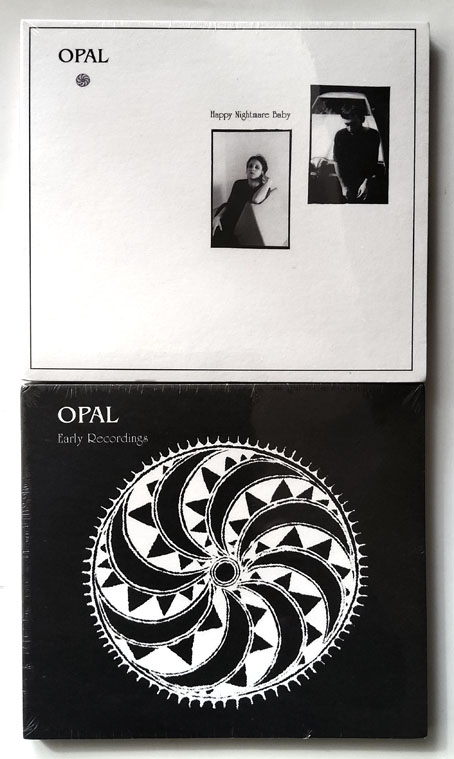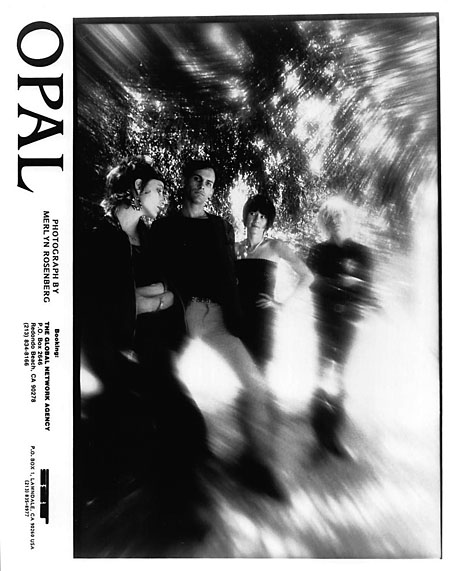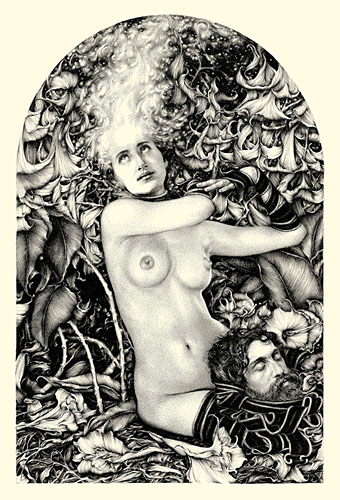
In the mail at the weekend, a pair of reissued Opal CDs that I didn’t expect to see any time soon, Happy Nightmare Baby (1987) and Early Recordings (1989). Opal were an American group who were active throughout the 1980s but they didn’t record very much, only releasing these two discs towards the end of their career. Both albums sank from sight in the early 1990s, and had been unavailable in any form when CD reissues were announced in late 2019 on guitarist David Roback’s own label, Salley Gardens. The reissues were withdrawn shortly before the release date, possibly as a result of Roback’s illness and subsequent death in February 2020. All of this is niche stuff but aficionados of the niche in question may like to know that I bought these new from an eBay (UK) seller for a fraction of the price you’ll pay at Discogs or elsewhere. (Here and here.) I’d seen reports that copies had been shipped before the cancellation was announced but hadn’t seen any on sale outside Discogs until last week. I’ve also seen suggestions that there might be bootlegs circulating but if these are boots then someone has managed to imitate the matrix numbers on the discs which I don’t think is an easy thing to do.

Opal is a group you seldom see mentioned today but plenty of people know the name of Mazzy Star, the group that Opal became after the departure of singer Kendra Smith in the late 1980s. David Roback was the key member, the link between Mazzy Star and the neo-psychedelia of the Los Angeles Paisley Underground which gave rise to both Opal and Roback’s other outlet, the Rain Parade. The Paisley Underground was never as psychedelic as I hoped it might be, only the Rain Parade could be classed as a bona fide psych band, but the groups associated with this loose scene—The Bangles, The Dream Syndicate, The Three O’Clock, et al—were all preoccupied with the music of the late 1960s, and of the early 70s via Neil Young and Alex Chilton. Opal followed the trend, being less oneiric than Mazzy Star would be, more concerned with reviving older musical styles than creating something new. Early Recordings, a collection of singles, EPs and other songs, owes less to psychedelia than it does to late-60s balladeering: guitar and vocals, lots of reverb and minimal percussion and keyboards. Kendra Smith, formerly of The Dream Syndicate, sings almost all the songs on both albums. The origin of the Opal sound may be found in the cover versions on Rainy Day (1984), a one-off album that David Roback recorded with Kendra Smith plus members of The Bangles, Rain Parade and The Three O’Clock. Lou Reed’s I’ll Be Your Mirror is the early Opal sound in miniature, especially in the version by Nico and The Velvet Underground which Roback emulates with Susanna Hoffs.
Happy Nightmare Baby has a rather prosaic monochrome cover but this is where the psychedelic rock comes to the fore, with Roback breaking out the fuzz box and wah-wah pedal to fashion a heavier sound that would later be heard on Mazzy Star songs like Ghost Highway. I said that only the Rain Parade warranted the psych label but Happy Nightmare Baby certainly gets there on songs like Magick Power and the slow explosion of Soul Giver, the latter being the closest that Opal get to the Rain Parade’s finest moment, No Easy Way Down. There’s also a touch of glam in the opening number, Rocket Machine, which harks back to the T. Rex of Electric Warrior. Happy Nightmare Baby is a fiery debut—and Opal could be even heavier live—but it’s one of those albums that you’d expect would be surpassed by later releases, instead of which all we have is Early Recordings*. The two albums are dissimilar enough to almost be the work of different groups; together they suggest that David Roback spent most of the 1980s trying to orient his music in a way that honoured his influences while also accommodating all his favoured modes of expression, from fuzz squall to languid blues to nocturnal drift. The first Mazzy Star album, She Hangs Brightly, is the place where the influences and intentions fused to create something new. And Roback found his ideal singer in Hope Sandoval, of course. Kendra Smith is okay but her voice can get monotonous over a whole album, she lacks Hope Sandoval’s mystique and emotional range. Opal were good but you can’t imagine many people wanting to cover their songs the way people have done with Mazzy Star. But then without Opal there might never have been a Mazzy Star. Niche stuff this may be but it doesn’t deserve to be buried for another thirty years.
* Or almost all. There is another album, Early Recordings Volume 2, a collection of unreleased songs and covers. But this has never been given an official release.
Previously on { feuilleton }
• Balloon parade
• The Dukes declare it’s 25 O’Clock!
• Strange Things Are Happening, 1988–1990


